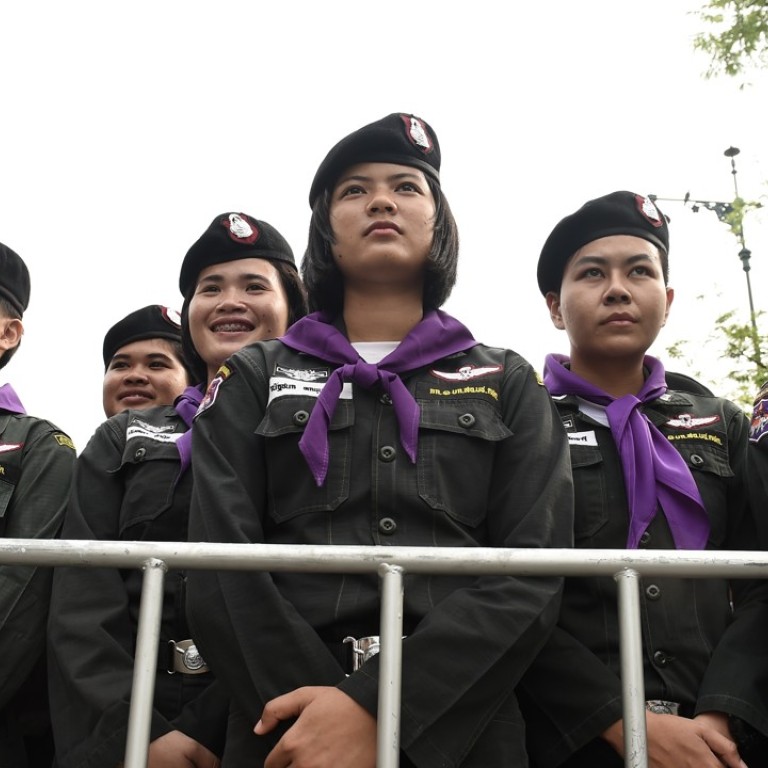
Arrested Development: women’s rights hit roadblock in Thailand with ban on female police cadets
A police academy’s decision is the latest sign the junta is firing blanks when it comes to promoting gender equality
Gender equality advocates criticised a major Thai police training academy this week as “ignorant” and “on the wrong side of history” for its decision to ban women from its programmes next year.
The Royal Police Cadet Academy (RPCA), on the western edge of the capital, Bangkok, declined to explain why women candidates would no longer be accepted. It is considered the country’s main commissioning institute for budding law enforcement officers, particularly those hoping to be considered for top positions in the force.
Though women can still become non-commissioned officers at other institutes, analysts and women’s rights advocates said the decision would cut the number of women in the force and affect the treatment of female victims of sex-related crimes.
“The number of female officers is already not enough. There are not even women police at every police station”, said Usa Lerdsrisuntad, director of the Foundation for Women.
James Ricketson: the 'spy' who loved Cambodia and paid for it
She said women police officers were key to investigating sex-related crimes and assaults, particularly in interviewing victims. Without female officers, “women might feel embarrassed and they will be reluctant to report”, she said.
“[The police] don’t see domestic violence as an important issue,” Lerdsrisuntad added.
Asked to explain the academy’s decision, deputy spokesman at the Royal Thai Police, Krissana Pattanacharoen, said the institute simply had to “comply with the curricula” of other branches of the armed forces, and he was not allowed to elaborate further.
“We accepted female cadets for the past 10 years … but at the same time we have to comply with the curricula as used by the military, navy and air forces cadets,” he said.

Lerdsrisuntad pointed to a long-running paternalistic culture within Thailand’s armed forces.
“Within the police, they think that women have limited capacities for this job,” she said. “But we have to see the positive side of women police. They might not be as strong as men, but women police can bridge the gap with many women who have been abused and want to talk to women police.”
Lerdsrisuntad said women officers were also banned from undertaking some police tasks because of prejudice.
“Women are not allowed to work at certain times, like night shifts, or wouldn’t get appointed for certain [top] positions,” she said.
Earlier this year, the Royal Thai Police force announced women would no longer be accepted as investigative officers, with spokesman Pattanacharoen again citing the need to comply with the armed forces.
In Thai election, any government you like – as long as it's the junta
Ruengrawee Pichaikul, director of the Gender and Development Research Institute (GDRI), said these decisions were reversing a recent positive trend towards greater inclusivity in Thailand’s police forces.
“[The RPCA] are so ignorant about what is going on in the world. We are promoting gender equality all over the world,” she said.
“What’s striking is that [the police] had been doing well in past years.”
The police began admitting female candidates into the academy in 2009.
Since then, Ruengrawee said, the force had enjoyed a “very inclusive” public image because of its targeted recruiting of not only women but also people from minority groups such as Muslims.

In 2016, the police also announced that they would promote three women to police chief in three stations in Bangkok.
Thailand’s military junta government, which seized power in 2014, has also approved several gender equality laws in recent years.
In 2015 they passed the Gender Equality Act, which states any “policy, rule, regulation, notification, project or procedures” approved by the government cannot discriminate against any gender. The Constitution, drafted and approved by the military, also includes gender equality provisions.
Thailand's monks run amok, but will junta's crackdown answer its prayers?
Women’s rights groups have accused the police of breaching some of the junta’s laws and have filed a petition calling for the Office of the Ombudsman to rule against the RPCA’s decisions.
Thailand’s seemingly equal opportunity attitude is nowhere near as prevalent in the armed forces themselves. None of the military, navy or air force training academies accepts female candidates, therefore restricting women from senior ranks.
“It is a ridiculous throwback to the past for the police to make this decision … It is on the wrong side of history,” said Paul Chambers, an expert on the Thai armed forces at Thailand’s Naresuan University.
“They want to use women for PR, but they don’t want women to compete with men, ultimately in commander positions.”

Chambers noted one example of the junta using women for its propaganda campaigns, when in May 2014 – immediately after the military coup – it deployed female soldiers in the streets of Bangkok to sing pleasant songs and take pictures with citizens.
Despite women not being allowed in Thailand’s armed forces training academies, they continue to be recruited for service in the country’s three southernmost provinces – a predominantly Muslim area where a conflict with insurgent groups has killed nearly 7,000 people since 2004.
Chambers said women were enlisted for the paramilitary forces because they were seen by local communities as more conciliatory than men.
“That is the only area that you can see security forces really wanting women to be something more than a publicity stunt,” he said. ■

